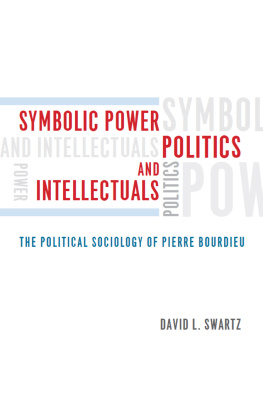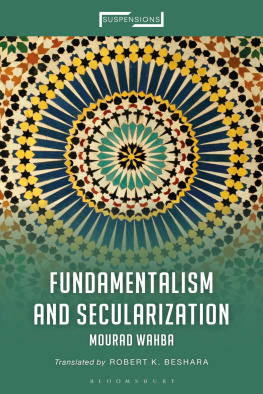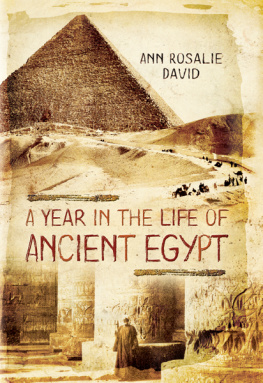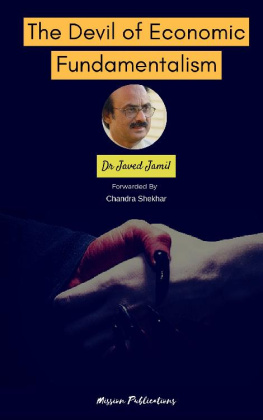FUNDAMENTALISM AND INTELLECTUALS IN EGYPT, 19731993
First published in 1995 in Great Britain by
Routledge
2 Park Square, Milton Park, Abingdon, Oxon, 0X14 4RN
270 Madison Ave, New York NY 10016
Transferred to Digital Printing 2007
Copyright 1995 The Harry S. Truman Research Institute,
The Hebrew University of Jerusalem
| British Library Cataloguing in Publication Data |
| Sagiv, David |
Fundamentalism and Intellectuals in |
Egypt, 197393 |
I. Title II. Svirsky, Gila |
297.0962 |
ISBN 0-7146-4581-8 |
Library of Congress Cataloging in Publication Data
Sagiv, David.
Fundamentalism and intellectuals in Egypt, 1973-1993 / David Sagiv ; translated by Gila Svirsky.
p. cm.
Includes bibliographical references and index.
ISBN 0-7146-4581-8
1. Islamic fundamentalism Egypt History 20th century. 2. Intellectuals Egypt Religious life. I. Title.
BP64.E3S24 1995
| 322. 10962 dc20 | 95-15888 |
| CIP |
All rights reserved. No part of this publication may be reproduced in any form or by any means, electronic, mechanical, photocopying, recording or otherwise, without the prior permission of Routledge
Typeset in 11/12 Berling
by Vitaset, Paddock Wood, Kent
Cover Photograph: The Star of Jericho: Daniel G. Pinkerton
Publishers Note
The publisher has gone to great lengths to ensure the quality of this reprint but points out that some imperfections in the original may be apparent
Contents
I would like to thank the Truman Research Institute for the Advancement of Peace of the Hebrew University of Jerusalem, and the head of the Institute, Professor Moshe Maoz, for assistance through the years of preparation of this study. I would also like to thank Bar-Ilan University for its assistance, with special thanks to Professor Michael Winter, who gave advice and encouragement throughout until the completion of this work. Special thanks also to the head of the Arabic Department at Bar-Ilan University, Dr David Doron, from whom I received the utmost encouragement and support.
My gratitude to Professor Shimon Shamir, head of the Tami Steinmetz Center for Peace Studies, Tel Aviv University, to Professor Jacob M. Landau of the Department of Political Science at the Hebrew University of Jerusalem, who read the manuscript, gave insightful comments, and recommended publication of the study, and to Professor Michael Bruno of Hebrew University, who furnished me with statistical data about economic conditions in Egypt. Heartfelt thanks to Ms Chaia Beckerman, director of publications at the Truman Institute, for her arduous efforts to coordinate the various elements required for publication. I am deeply grateful to Ms Gila Svirsky, an able editor and translator with whom I labored to produce the English version of this book, for the quality of her work and her meticulousness.
I would like to express my appreciation to my wife Marcelle and to my family for their encouragement and understanding throughout the years of this research, which required a great deal of time, including many absences for gathering material and for conducting interviews in Egypt and elsewhere. Without their encouragement, this work could not have been completed.
Before its publication, this work was awarded the Michael Landau Prize of Mifal HaPayis for political science and Arabic studies, in 1990, at the recommendation of Bar-Ilan University.
David Sagiv, Jerusalem
The Egyptian people are a religious people who revere their faith. They perceive religion as being of paramount importance, an integral facet of the nations culture, folklore and society. Islamic groups, each according to its doctrine, capitalize on this, using all their strength to undermine the state and attain the common goal: application of Islamic law (Sharia) and the installation of Islamic rule free from all Western influence. Such was the case, these groups believe, in the time of Muhammad the Prophet and his early followers; they idealize the period of the genesis of Islam, and according to their teachings only a return to this golden age can cure the ills of modern Egypt. Arguing that Western influence, beginning with the invasion of Napoleon, is at the root of the evil, they support their writings and declarations with interpretations of Quranic passages by Ahmad Ibn Hanbal and Ibn Taymiyya, both of whom call for close textual reading of the Quran and Hadith, and a rejection of all interpretations, philosophies and accompanying texts.
Even the non-religious dare not castigate religion or its representatives in public. They undertake any such criticism cautiously, with moderation. They preface their words with an apology, explaining that it is not their intention to attack religion or the religious spirit, but merely to remove some of the dust that has clung to it over the generations. This is the approach that most Egyptian intellectuals adopt in criticizing their countrys religious extremists.
This apologetic attitude does not spare them the wrath of the religious zealots, but the intellectuals will not overstep the line, since the majority also consider themselves religious. Examples are legion. Most of Egypts leading writers publish books or articles demonstrating their religious faith before or shortly after the start of their literary careers, in order to defray in advance a debt to their readers and society. No matter whether they are liberals or socialists (with the exception of fully-fledged communists who define themselves as ilmaniyyun [secular]), they show respect and courtesy toward religion.
Such was the course followed by Egypts first great modern writer, Muhammad Husain Haikal, and after him, by Taha Husain, Ahmad Amin, Abbas Mahmud al-Aqqad, Tawfiq al-Hakim, Naguib Mahfouz, Abd al-Rahman al-Sharqawi, Yusuf Idris and others. Even though some of these writers did not address religious issues, many found themselves under attack or boycott by the religious establishment; in some cases one or more of their books may have been proscribed for certain periods, and works considered anti-religious permanently banned. Traditionally, though, the clerics, and their chief representatives, the ulama of al-Azhar, knew where to draw the line. It was rare to encounter threats or the actual use of physical violence against intellectuals, nor was it common practice to confiscate or burn their books.
Bernard Lewis has written:
Modern Western man, being unable for the most part to assign a dominant and central place to religion in his own affairs, found himself unable to conceive that other peoples in any other place could have done so, and was therefore impelled to devise other explanations of what seemed to him only superficially religious phenomena We are prepared to allow religiously defined conflicts to accredited eccentrics like the Northern Irish, but to admit that an entire civilization can have religion as its primary loyalty is too much. Even to suggest such a thing is regarded as offensive by liberal opinion always ready to take protective umbrage on behalf of those whom it regards as its wards. This is reflected in the present inability, political, journalistic, and scholarly alike, to recognize the importance of the factor of religion in the current affairs of the Muslim world and in the consequent recourse to the language of left-wing and right-wing, progressive and conservative, and the rest of the Western terminology, the use of which in explaining Muslim political phenomena is about as accurate and as enlightening as an account of a cricket match by a baseball correspondent1.







